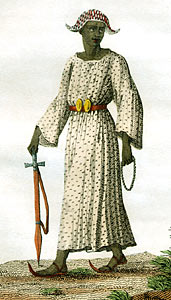Funj people: Difference between revisions
Narky Blert (talk | contribs) Link to DAB page repaired |
mNo edit summary |
||
| Line 1: | Line 1: | ||
[[File:King sennar 1821.jpg|thumb|A Sennar King around 1821, a member of the Funj ethnic group.]] |
[[File:King sennar 1821.jpg|thumb|A Sennar King around 1821, a member of the Funj ethnic group.]] |
||
The '''Funj''' are an ethnic group in present-day [[Sudan]]. The [[Funj]] tribe set up the [[Funj Sultanate of Sinnar]] with [[Abdallah Jamma]] that ruled the area for several centuries. |
|||
| ⚫ | The |
||
| ⚫ | The origins of the Funj are not clearly known. However, there are three different hypotheses regarding their origin. The most cited and known origin for the [[Funj]] is that they are descendants of [[Banu Umayya]], who escaped the slaughter of the [[Abbasids]] by fleeing into [[Ethiopian Empire|Abyssinia]] and moving inward in to the [[Nubians|Nubian]] territory who had been known in [[Arabia]] since ancient times to protect guests and refugees. The second hypothesis comes from [[James Bruce]], who theorized in his book [[Travels to Discover the Source of the Nile]] that the Funj descend from the [[Shilluk people]]. [[James Bruce]] wrote his book after 22 years of travel through [[North Africa]] and [[Ethiopia]]. The third hypothesis is that they are descents of the remnants of the Kingdom of [[Alodia]] Nubians who escaped further south to replenish their supplies and resources and returned to establish their state. The most cited source in [[Sudan]] is that they are Nubians who mixed with [[Arabs]]. |
||
==References== |
==References== |
||
{{Reflist}} |
{{Reflist}} |
||
Revision as of 01:50, 31 January 2018

The Funj are an ethnic group in present-day Sudan. The Funj tribe set up the Funj Sultanate of Sinnar with Abdallah Jamma that ruled the area for several centuries.
The origins of the Funj are not clearly known. However, there are three different hypotheses regarding their origin. The most cited and known origin for the Funj is that they are descendants of Banu Umayya, who escaped the slaughter of the Abbasids by fleeing into Abyssinia and moving inward in to the Nubian territory who had been known in Arabia since ancient times to protect guests and refugees. The second hypothesis comes from James Bruce, who theorized in his book Travels to Discover the Source of the Nile that the Funj descend from the Shilluk people. James Bruce wrote his book after 22 years of travel through North Africa and Ethiopia. The third hypothesis is that they are descents of the remnants of the Kingdom of Alodia Nubians who escaped further south to replenish their supplies and resources and returned to establish their state. The most cited source in Sudan is that they are Nubians who mixed with Arabs.
References
External links
- . Encyclopædia Britannica (11th ed.). 1911.
